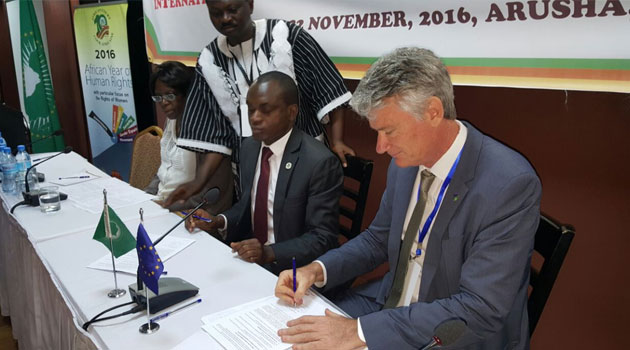
The EU’s Head of Delegation to the African Union Ambassador Ranieri Sabatucci says there is no reason why African countries should pull out of the treaty that established the International Criminal Court/BERNARD MOMANYI
ARUSHA, Tanzania, Nov 24 – Amid increased campaign by African leaders to withdraw their countries from the Rome Statute, the European Union (EU) is strongly advising against the move.
The EU’s Head of Delegation to the African Union Ambassador Ranieri Sabatucci says there is no reason why African countries should pull out of the treaty that established the International Criminal Court (ICC).
The treaty was adopted at a diplomatic conference in Rome on July 17, 1998 but entered into force on July 2002 and has since seen leaders – mainly from Africa prosecuted with very little convictions.
“African countries should remain in the Rome Statute rather than withdrawing from it,” Sabatucci told delegates in Arusha Wednesday at the opening of the Fifth Annual High Level Dialogue on Democracy, Human Rights, Women Rights and Governance in Africa.
The EU will be holding high level discussion on human rights with the African Union in January next year where issues to do with planned mass pull-out from the Rome Statute will feature.
“The dialogue will be a good occasion for the EU and AU to take stock of the above developments, as well as many others,” he said of the meeting that will be preceded by the EU-AU Civil Society Forum.
Most African leaders, including Kenya’s Uhuru Kenyatta and his Deputy William Ruto have been vocal on the need for African countries to pull out of the Rome Statute, while accusing The Hague-based court of “selective justice.”
The two were among six Kenyans prosecuted for crimes against humanity charges they were accused of perpetrating during the disputed presidential election of 2007, leading to deadly chaos that left over 1,100 people dead and more than half a million others displaced.
All their charges were later dropped for lack of evidence or witnesses to prove their involvement.
Riding on the acquittal, the Kenyan leaders then launched a campaign at the AU to rally other African countries for a mass pull out from the Rome Statute, leading to the recent announcement by Gambia, Burundi and South Africa which have already set in motion the formal withdrawal process.
“There are many Western countries, at least 30, that have committed heinous war crimes against independent sovereign states and their citizens since the creation of the ICC and not a single Western war criminal has been indicted,” said Sheriff Bojang, Gambia’s Information Minister while announcing the country’s pull-out plan, and accused the court for being used “for the persecution of Africans and especially their leaders while ignoring crimes committed by the West.”
But the Head of the EU Delegation to the AU is not convinced that as many African countries are prepared to quit the Rome Statute despite the heightened campaign and publicity around it.
“EU is a staunch supporter of the Rome Statute,” Sabatucci said, “I am happy to note that many African countries said the same at the Assembly of States Parties in The Hague that is going on now.”
At the Wednesday meeting, high level dialogue officiated by Tanzania’s Vice President Samia Suluhu Hassan, calls for African countries to uphold and protect human rights took centre stage.
“The bitter truth is that human rights violation is still notable in various parts of our continent, especially among women and children who are mostly affected,” Hassan said.
Justice Sylvain Ore who heads the African Court for Human and People’s Rights (AfCHPR) emphasised the need for human rights institutions on the continent to work in more active synergy with the regional economic community organs.
“The adoption by ECOWAS, the EAC and SADC of similar norms on human rights, democracy and good governance requires us to work more towards the harmonization rather than the duplication of norms,” he told the conference, and urged African countries to fully protect human rights.
The meeting that opened on Wednesday is part of celebrations to mark 10 years of the AfCHPR’s existence.









































